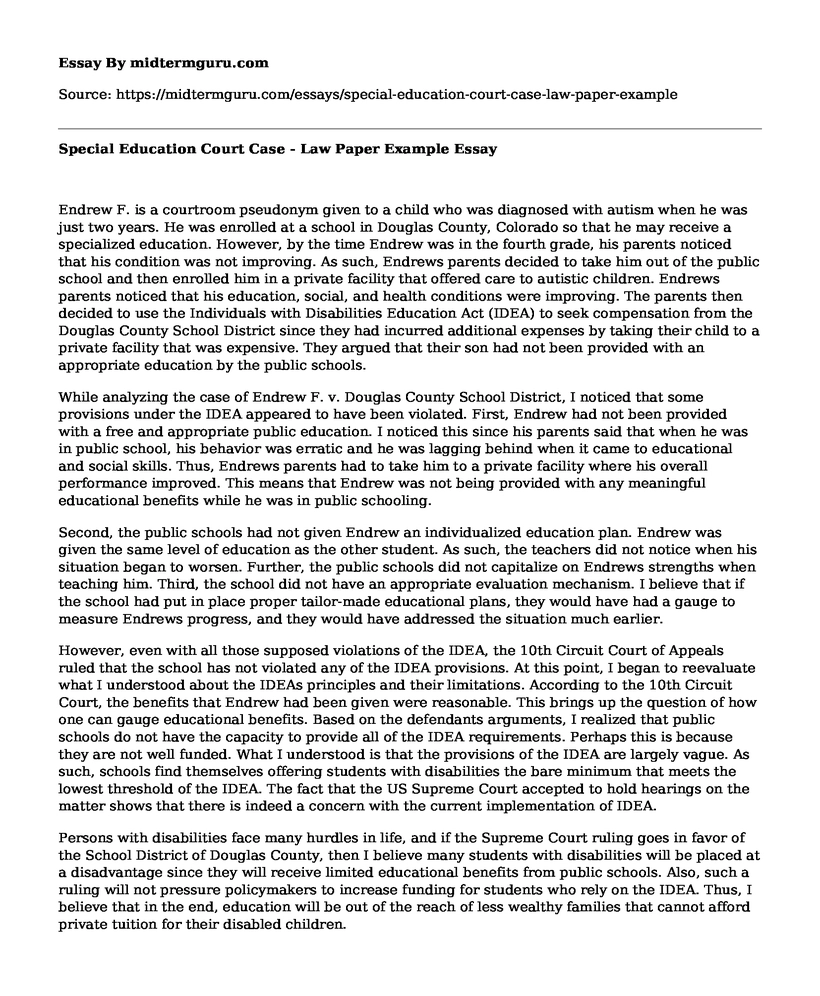Endrew F. is a courtroom pseudonym given to a child who was diagnosed with autism when he was just two years. He was enrolled at a school in Douglas County, Colorado so that he may receive a specialized education. However, by the time Endrew was in the fourth grade, his parents noticed that his condition was not improving. As such, Endrews parents decided to take him out of the public school and then enrolled him in a private facility that offered care to autistic children. Endrews parents noticed that his education, social, and health conditions were improving. The parents then decided to use the Individuals with Disabilities Education Act (IDEA) to seek compensation from the Douglas County School District since they had incurred additional expenses by taking their child to a private facility that was expensive. They argued that their son had not been provided with an appropriate education by the public schools.
While analyzing the case of Endrew F. v. Douglas County School District, I noticed that some provisions under the IDEA appeared to have been violated. First, Endrew had not been provided with a free and appropriate public education. I noticed this since his parents said that when he was in public school, his behavior was erratic and he was lagging behind when it came to educational and social skills. Thus, Endrews parents had to take him to a private facility where his overall performance improved. This means that Endrew was not being provided with any meaningful educational benefits while he was in public schooling.
Second, the public schools had not given Endrew an individualized education plan. Endrew was given the same level of education as the other student. As such, the teachers did not notice when his situation began to worsen. Further, the public schools did not capitalize on Endrews strengths when teaching him. Third, the school did not have an appropriate evaluation mechanism. I believe that if the school had put in place proper tailor-made educational plans, they would have had a gauge to measure Endrews progress, and they would have addressed the situation much earlier.
However, even with all those supposed violations of the IDEA, the 10th Circuit Court of Appeals ruled that the school has not violated any of the IDEA provisions. At this point, I began to reevaluate what I understood about the IDEAs principles and their limitations. According to the 10th Circuit Court, the benefits that Endrew had been given were reasonable. This brings up the question of how one can gauge educational benefits. Based on the defendants arguments, I realized that public schools do not have the capacity to provide all of the IDEA requirements. Perhaps this is because they are not well funded. What I understood is that the provisions of the IDEA are largely vague. As such, schools find themselves offering students with disabilities the bare minimum that meets the lowest threshold of the IDEA. The fact that the US Supreme Court accepted to hold hearings on the matter shows that there is indeed a concern with the current implementation of IDEA.
Persons with disabilities face many hurdles in life, and if the Supreme Court ruling goes in favor of the School District of Douglas County, then I believe many students with disabilities will be placed at a disadvantage since they will receive limited educational benefits from public schools. Also, such a ruling will not pressure policymakers to increase funding for students who rely on the IDEA. Thus, I believe that in the end, education will be out of the reach of less wealthy families that cannot afford private tuition for their disabled children.
Cite this page
Special Education Court Case - Law Paper Example. (2021, Jun 02). Retrieved from https://midtermguru.com/essays/special-education-court-case-law-paper-example
If you are the original author of this essay and no longer wish to have it published on the midtermguru.com website, please click below to request its removal:
- Human Right in Kurdistan, Saudi Arabia and Syria - Paper Example
- Responsibility of Vendors to Timmys Accident - Paper Example
- The Need for Gun Control - Essay Example
- Police Brutality Research Paper
- The Sixth and Seventh Amendments of the Constitution - Paper Example
- The Contribution of James Baldwin as a Social Worker - Essay Sample
- Terrorism: A Constant Threat to Global Security - Research Paper







